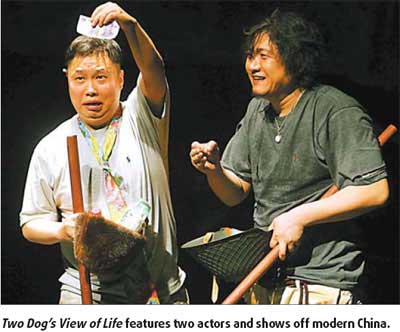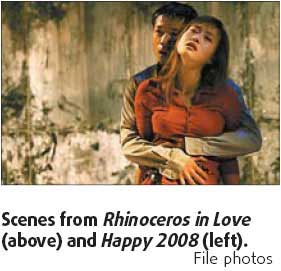Six friends are hanging out on a Friday evening: The seafood is plentiful and the conversation is flowing. One girl, wearing big-hooped earrings, a trendy velvet jacket and a good deal of carefully applied makeup, describes her recent night at a small theater with great gusto.
"Let's go tonight," says a young man who wants to buy tickets immediately, in case the show is sold out.
Drama in Beijing is no longer the preserve of top-billing, professional artists at the Peking Opera House. Small-theater dramas have arrived and are attracting young urban Chinese, normally found drinking at Starbucks, wearing Nike fashion and blogging obsessively.
During the Christmas, New Year and Spring Festival period, big cities in China are preparing for another hectic season of theater performances and there is certainly no shortage of variety.
The Beijing Children's Art Theater is usually a place for puppet shows and children's plays, but this winter the stalls are packed with young couples, chattering college students, and rarely seen celebrities watching one of the hottest shows in town.
Madame Bovary is Me, is innovative Hong Kong director Edward Lam's adoption of Gustave Flaubert's classic Madame Bovary. Lam set the stage of Madame Bovary in modern Hong Kong, Taiwan, and the Chinese mainland, and focuses on social celebrities and upper class women.
"Everybody could be Madame Bovary," says a 22-year-old girl from Beijing, surnamed Zhang. "Through the depiction of these familiar Bovarys, we identify ourselves." She says going to small theaters has become her, as well as her friends' habit after work.
"Small theater drama will definitely be a part of our Christmas program," she says.
Just around the block, the Beijing East Pioneer Theater is also filled to capacity for the return performance of the highly successful Two Dogs' View on Life, from director Meng Jinghui. Audiences explore some of the big questions facing Chinese society from a canine's perspective in this new cutting-edge drama directed by Meng, an avant-garde Chinese director and playwright.
Two Dog's View of Life still wins applause from audiences. With a small stage and a chair, this two-hander shows off modern China, delivered in Beijing dialect.
"The two dogs at the center of play look at all kinds of everyday issues, from online relationships to weight loss campaigns, poisonous food to traffic jams, and even sky-high education fees," says Chi Le, a member of the audience.
Chinese drama has witnessed a revival since 1998 and the trend continues.
"There is fair weather ahead for Chinese drama," says Fu Weibo, a sales manager in Beijing People's Art Theater. Most of the people in the audience are between the age of 20 to 30.
Where regular theaters seat 1,000 or more people, the mini-theaters typically hold 200 to 300. The advantages offered by these spaces are obvious: Audiences sit closer to the stage, so they can more easily form an intimacy with performers and more easily immerse themselves in the plot. Furthermore, the small stages allow directors to more easily customize set dcor to different audiences.
Unlike traditional theater, avant-garde works can explore a variety of other genres. Directors and scriptwriters, such as Lin Zhaohua, Meng Jinghui and Guo Shixing, have worked to spice up their shows by introducing many new elements, such as dance, popular music, folk ballads and even operatic singing. Most importantly, they load their productions with real-life topics.
Leading theater director Meng Jinghui's on-stage exploits have stirred up a storm of Chinese experimental drama in recent years.
"In my opinion, the most appealing part of Two Dog's View of Life is the way the two leading actors challenge the traditional acting style," he says.
"As they integrate Western elements into an Eastern performance style, they bring out something quite local, quite unique. They express the feelings of people in contemporary life through their performance."
But the play pushes the envelope even further. It has no pre-written script, no set scenes and possibly no plot. The two actors in the cast, Liu Xiaoye and Chen Minghao, created the concept seven years ago.
"This drama has no setting or background. We simply integrate punk and crazy acting," he says.
"Drama is above all for the audience's enjoyment. While it is easy to wear the mask of obscurity and equivocation, it is tough to really communicate with the audience.
"We have broken a lot of the existing rules of performance and created our own unique style to speak people's minds."
The play has a lot of modern elements, which arouse young people's responses, such as the punk rock theme song, I Wanna Be Your Dog.
Without a big budget and major stars, small-theater dramas are winning not only applause from critics and audiences but are also making money.
"I don't think small-scale productions are inferior to traditional dramas," Meng says.
"It depends on your perspective. Nowadays a lot of people are under enormous pressure and thus are prone to be moody. This is not something to be ashamed of.
"On the contrary, this trend shows a demand that provides considerable space for nourishing our spirit. We make our own choices."
Ranging from 50 to 200 yuan (US$7-US$27), the low ticket price is another reason why small theater drama is getting more popular among young people.
Many drama production companies are also targeting the holiday season market, bringing new or re-played dramas.
Taiwan theater director Stan Lai offers his new play, Total Woman, featuring Taiwan's top comedian Fang Fang, popular talk-show host Ah-Ya, and Yang Ting from the Chinese mainland.
Although Total Woman debuted in Taipei as early as 2005, Lai is tailoring it for the mainland audience particularly during the Christmas season.
Stan Lai is considered as the most influential voice in Chinese-language theater. His last stage drama, Secret Love in Peach Blossom Land, was a great success.
(China Daily December 25, 2007)



